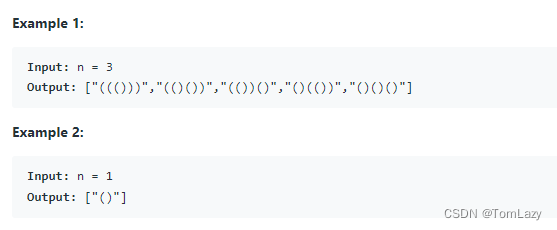题目链接: https://leetcode.com/problems/generate-parentheses/
1. 题目介绍(括号生成)
Given n pairs of parentheses, write a function to generate all combinations of well-formed parentheses.
【Translate】: 给定n对括号,写一个函数来生成所有格式良好的括号的组合。
【测试用例】:

【约束】:

2. 题解
2.1 递归
??brobins9提供的题解 Easy to understand Java backtracking solution
主要思想:The idea here is to only add ‘(’ and ‘)’ that we know will guarantee us a solution (instead of adding 1 too many close). Once we add a ‘(’ we will then discard it and try a ‘)’ which can only close a valid ‘(’. Each of these steps are recursively called.
伪代码转化:
The code will be:
//base case
if(string length == 2*n) {
add(string);
return;
}
//recursive case
if(number of “(“s < n){
add a “(“
}
if(number of “(“s > number of “)”s){
add a “)"
}
// an example to understand this solution:
(
((
(((
((()
((())
((()))
(()
(()(
(()()
(()())
(())
(())(
(())()
()
()(
()((
()(()
()(())
()()
()()(
()()()
public List<String> generateParenthesis(int n) {
List<String> list = new ArrayList<String>();
backtrack(list, "", 0, 0, n);
return list;
}
public void backtrack(List<String> list, String str, int open, int close, int max){
if(str.length() == max*2){
list.add(str);
return;
}
if(open < max)
backtrack(list, str+"(", open+1, close, max);
if(close < open)
backtrack(list, str+")", open, close+1, max);
}

2.2 Iterative
??left_peter提供的题解 An iterative method. 该方法的思想DP。首先考虑如何从前面的结果f(0)…f(n-1)得到结果f(n)。实际上,结果f(n)和f(n-1)加了一个()对。让"(“总是在第一个位置,为了产生一个有效的结果,我们只能将”)"以这样一种方式放置:在额外的()里面有i对(),在额外的()外面有n - 1 - i对()。
f(0): ""
f(1): "("f(0)")"
f(2): "("f(0)")"f(1), "("f(1)")"
f(3): "("f(0)")"f(2), "("f(1)")"f(1), "("f(2)")"
So f(n) = "("f(0)")"f(n-1) , "("f(1)")"f(n-2) "("f(2)")"f(n-3) ... "("f(i)")"f(n-1-i) ... "(f(n-1)")"
public List<String> generateParenthesis(int n)
{
List<List<String>> lists = new ArrayList<>();
lists.add(Collections.singletonList(""));
for (int i = 1; i <= n; ++i)
{
final List<String> list = new ArrayList<>();
for (int j = 0; j < i; ++j)
{
for (final String first : lists.get(j))
{
for (final String second : lists.get(i - 1 - j))
{
list.add("(" + first + ")" + second);
}
}
}
lists.add(list);
}
return lists.get(lists.size() - 1);
}

